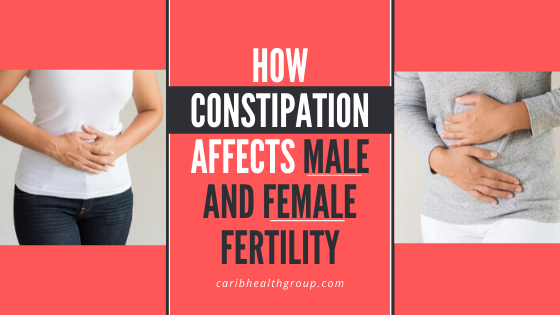Does Constipation Affect Fertility?
Yes, your fertility can become endangered when constipation exists and or persists.
Constipation mostly occurs when stool or waste moves too slowly through the digestive tract to the rectum. This makes the colon absorb more water hence making the fecal matter dry and hard for elimination.
However, several factors can increase the chances of having constipation, including not drinking enough fluids, lack of exercise, having a high fever, poor diet (not enough fiber, fruits, vegetables and grains), sedentary lifestyle, dehydration, stress, travel, change in diet, some medications (iron supplements, certain antidepressants, pain-relieving medications containing opiates such as codeine, aluminium-containing antacids), polypharmacy (use of four or more medications or the use of more medications than are medically necessary), holding in stool, weaker abdominal and pelvic muscle, reduced gastrocolic reflex secondary to smaller meal sizes
Symptoms of constipation
- Reduced frequency i.e no bowel movement in a day
- Hard stool and difficult defecation
- Passage of small, hard stools
- Incomplete emptying of the bowel
- Pain in the anus or abdomen
- Bloating in the abdomen
Diseases associated with constipation
- Intestinal obstruction
- Renal failure
- Diabetes
- Parkinson’s disease (a degenerative disorder of the central nervous system that mainly affects the motor system)
- Hypothyroidism (a condition in which the body lacks sufficient thyroid hormone)
- Uterine fibroids (tumors in the uterus)
Complications
Complications that can arise from constipation include hemorrhoids (swollen veins around the anus), anal fissures, weakening of the connection between the pelvis and anus,
So how can constipation affect your fertility?
Constipation is a common symptom associated with other diseases, which may cause fertility problems, such as uterine fibroids, ovarian cancer, and prostate cancer.
Female fertility
Uterine fibroids are benign smooth muscle tumors of the uterus. Fibroids that develop in the back of the uterus can press on the colon from the outside, and in some cases, cause constipation. Fibroids, depending on where it is located, can also interfere with sperm reaching the egg, preventing implantation of a fertilized egg in the uterus, or blocking a fallopian tube. Women that have fibroids that cause heavy menstrual bleeding can become anemic, this may require intake of iron supplements which can sometimes cause constipation.
Ovarian cancer is a cancerous growth arising from the ovary. some women with ovarian cancer state symptoms like abdominal discomfort, abdominal pain, bloating, back pain, pressing urination, constipation, tiredness, pelvic pain, abnormal vaginal bleeding, weight loss, etc. Ovarian cancer and its treatment may result in the removal of both ovaries and fallopian tubes, and the uterus, which can affect fertility.
Male fertility
The prostate gland is located below the bladder which is in front of the rectum. Tumor in this location can interfere with digestive functions. Though, chronic constipation can contribute to an enlarged prostate by putting pressure on the gland, as well as vice versa. Chronic constipation and intestinal problems can also be an early indicator of colon cancer. For some men, prostate cancer and its treatment can lead to permanent infertility. While for others, treatment may stop or slow sperm production for many years before it returns. Generally, men who receive higher doses of radiation therapy or chemotherapy wait longer to recuperate sperm production. These men also have a higher risk of permanent infertility.
Prevention
The development of constipation can be reduced by regular exercise, a high fiber diet, regular and adequate fluid intake.
Sherese Ijewere
Nutrition Consultant – Get in touch

